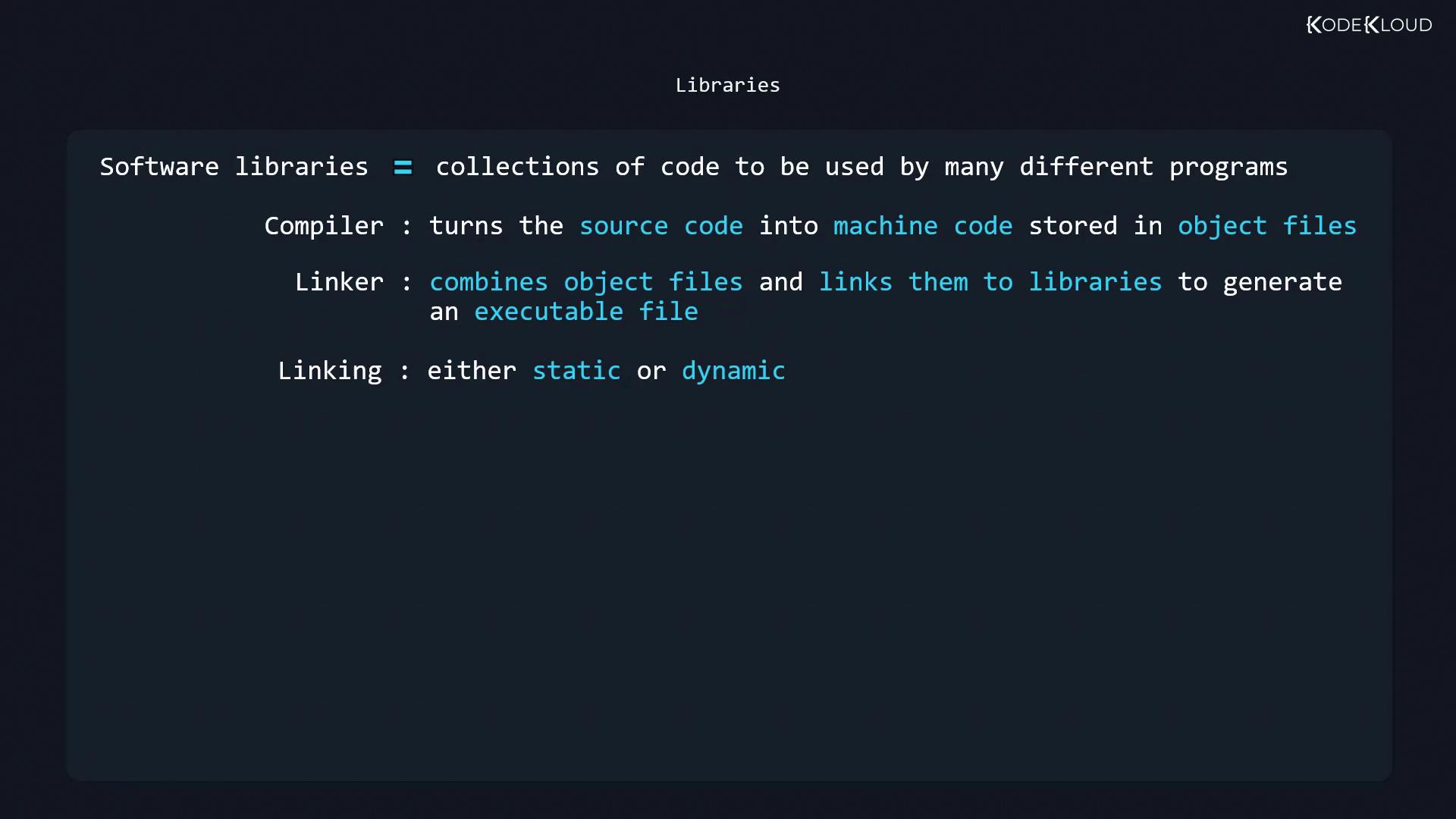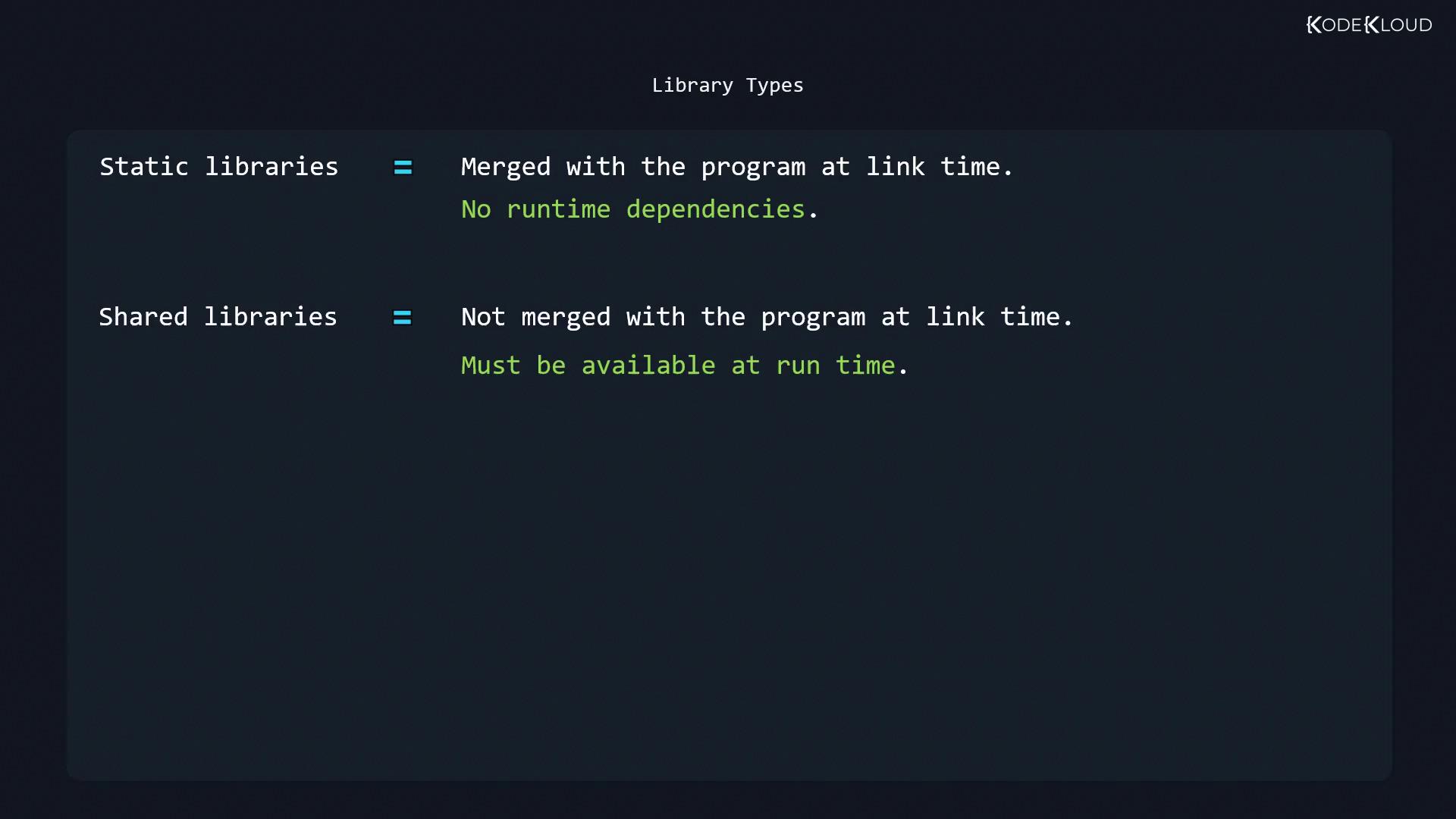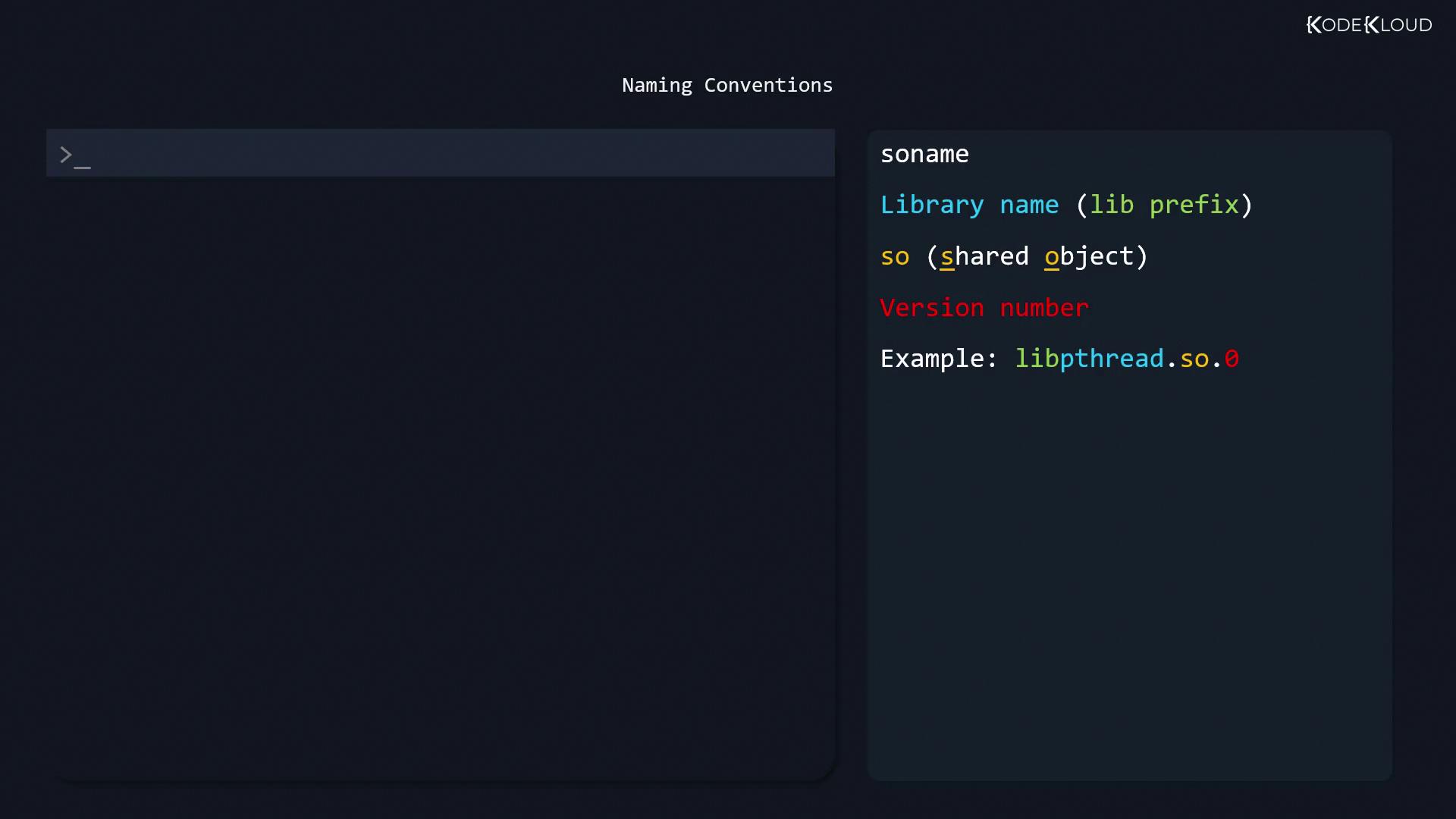Linux Professional Institute LPIC-1 Exam 101
Linux Installation and Package Management
Manage Shared Libraries
In this lesson, we explore how to manage shared libraries on Linux. You’ll learn about compilation vs. linking, static and dynamic libraries, naming conventions, library paths, dynamic linker configuration, and dependency inspection.
1. Compilation vs. Linking
Building an executable from source involves two key steps:
Compilation
The compiler (e.g.,gcc) translates source files (.c,.cpp) into object files (.o).Linking
The linker combines object files and connects them to libraries, producing the final executable.
Linking can be:
- Static: Library code is embedded into the executable.
- Dynamic: Executable references shared libraries at runtime.

2. Static Libraries vs. Shared Libraries
Static Libraries (.a)
- Merged into the executable at link time.
- No runtime dependency on external files.
- Larger binary size, but fully self-contained.
Note
Static linking increases the size of the executable since all used library code is included.
Shared (Dynamic) Libraries (.so)
- Executable holds references, not library code.
- Resolved by the dynamic linker at runtime.
- Multiple programs can share a single library instance in memory, saving disk and RAM.

3. Shared Library Naming Conventions
Shared libraries follow the SONAME pattern:
lib{name}.so.{major}
lib: prefix.so: shared object{major}: major version
Example:
libpthread.so.0

On Debian 9.9, the GNU C library’s SONAME is libc.so.6, typically a symlink to the full version. Static archives end with .a, for example libpthread.a.
4. Common Library Locations
Shared libraries are usually installed in these directories:
| Directory | Description |
|---|---|
/lib | 32-bit system libraries |
/lib32 | 32-bit compatibility |
/lib64 | 64-bit system libraries |
/usr/lib | Standard library path |
/usr/local/lib | Local (custom) libraries |
5. Dynamic Linker Configuration
The dynamic linker (ld.so or ld-linux.so) reads /etc/ld.so.conf to locate libraries:
include /etc/ld.so.conf.d/*.conf
Each file in /etc/ld.so.conf.d/ lists absolute library directories, for example:
/usr/local/lib
After editing, rebuild the cache and create necessary symlinks:
sudo ldconfig -v
Sample output:
/usr/local/lib:
/lib/x86_64-linux-gnu:
libfuse.so.2 -> libfuse.so.2.9.7
libnss_myhostname.so.2 -> libnss_myhostname.so.2
libidn.so.11 -> libidn.so.11.6.16
...
Query for a specific library:
sudo ldconfig -p | grep libfuse
# libfuse.so.2 (libc6,x86-64) => /lib/x86_64-linux-gnu/libfuse.so.2
Inspect the symlink:
ls -l /lib/x86_64-linux-gnu/libfuse.so.2
# lrwxrwxrwx 1 root root 16 Aug 21 2018 /lib/x86_64-linux-gnu/libfuse.so.2 -> libfuse.so.2.9.7
6. LD_LIBRARY_PATH Environment Variable
LD_LIBRARY_PATH is a colon-separated list of directories the dynamic linker checks before standard paths.
export LD_LIBRARY_PATH=/usr/local/mylib:$LD_LIBRARY_PATH
echo $LD_LIBRARY_PATH
# /usr/local/mylib:...
To remove it:
unset LD_LIBRARY_PATH
Warning
Overusing LD_LIBRARY_PATH can cause version conflicts and security issues. Prefer updating /etc/ld.so.conf.d/ and running ldconfig for persistent changes.
For permanent updates, add the export line to ~/.bashrc or /etc/profile.
7. Inspecting Dependencies with ldd
Use ldd to list shared libraries an executable depends on:
ldd /usr/bin/git
Example output:
linux-vdso.so.1 => (0x00007ffcbb310000)
libpcre.so.3 => /lib/x86_64-linux-gnu/libpcre.so.3 (0x00007f18241eb000)
libz.so.1 => /lib/x86_64-linux-gnu/libz.so.1 (0x00007f1823fd1000)
libresolv.so.2 => /lib/x86_64-linux-gnu/libresolv.so.2 (0x00007f1823db6000)
libpthread.so.0 => /lib/x86_64-linux-gnu/libpthread.so.0 (0x00007f1823b99000)
librt.so.1 => /lib/x86_64-linux-gnu/librt.so.1 (0x00007f1823991000)
libc.so.6 => /lib/x86_64-linux-gnu/libc.so.6 (0x00007f18235c7000)
/lib64/ld-linux-x86-64.so.2 (0x00007f182445b000)
To list unused direct dependencies:
ldd -u /usr/bin/git
Example:
Unused direct dependencies:
/lib/x86_64-linux-gnu/libz.so.1
/lib/x86_64-linux-gnu/libpthread.so.0
/lib/x86_64-linux-gnu/librt.so.1
Unused entries often result from linker options during the build process.
References
Watch Video
Watch video content